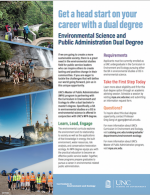Mary Tiger has always been passionate about protecting the environment. After graduating from UNC-Asheville, Tiger applied her Environmental Science degree by working for the Southern Environmental Law Center.
While working there to promote environmental advocacy, Tiger saw a need to establish local governments as an informed partner in the push for stronger environmental protections.
“I saw a need for those on the front lines of government to be passionate about the environment and knowledgeable about the science behind it,” said Tiger.
Invigorated by this commitment to bring government into the fold, Tiger went to work for the City of Loveland’s Department of Water and Power in Colorado.
It was there that Tiger’s interest piqued, as she discovered the indispensable role local government plays in environment protection.
“That’s really what motivated me to get my MPA,” said Tiger. “I wanted to learn how to get things done at the local level.”
During her two years with the MPA program, Tiger’s education in public administration came from inside the classroom – where she learned, among other topics, about organizational structure and management – and out – where she worked on funding environmental initiatives with the School of Government’s Environmental Finance Center.
Through her coursework and hands-on experience, Tiger learned how to transform her passion into real change.
“I had the knowledge and appreciation for environmental protections, but the MPA program gave me the tools to apply that knowledge into making it happen,” said Tiger.
After obtaining her MPA degree, Tiger directed applied research projects and oversaw business operations at the Environmental Finance Center before making her way to the Orange Water and Sewer Authority in August 2015.
In her role there as Sustainability Manager, Tiger works to incorporate what she refers to as the “triple bottom line” into the utility’s operations and planning: balancing financial, social, and environmental sustainability needs.
From implementing energy management strategies to establishing affordability outreach programs for disadvantaged communities, Tiger’s position demands she wears many hats.
Luckily, her degrees in environmental science and public administration allow her to achieve this hat trick and maintain a strong governmental voice in favor of environmental protections.
For Tiger, the opportunity to link her environmental passions with her public administration studies has been invaluable – and one she is glad to see now being formally offered through the new dual degree program.
And while the push for environmental sustainability will inevitably face obstacles, Tiger is hopeful that the new program will equip a new generation of students with the tools needed to lead the charge in addressing these challenges.
“As an undergraduate, the science I studied made clear the need for environmental protection, and my passion to do so led me towards environmental advocacy,” said Tiger.
“What’s so great about partnering environmental studies and public administration is that you can channel that passion into public service and advance local government’s role in environmental protection.”


